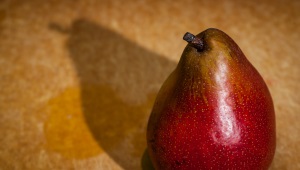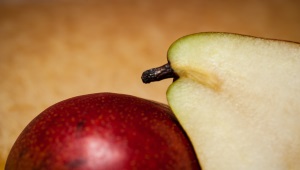The Fruit of the Spirit: Goodness

“I’m good.” “It’s all good.” “Good news!” The word good is our default for anything vaguely positive. But what do we mean when we talk about goodness? Moreover, what does God mean by offering goodness as a fruit of the Spirit?
The Divine Goodness of Creation
When I think of goodness, I think of the creation narrative in Genesis 1. The passage uses the word good seven times—a number that alludes to completeness or perfection throughout biblical literature. Light and dark, skies and seas, stars, fish, birds, and all the creatures of the land are each created to be completely, perfectly good.
Imagine God, like a homeowner at Christmas, hanging the wreaths, plugging in the lights, standing back with his triune family . . . “Then God saw everything that He had made, and indeed it was very good” (Genesis 1:31).
It’s a scene of complete awe. 
Treating All of Creation with Divine Goodness
When you and I see everything that God has made—from snakes to sunsets, friends to foes—is it still a scene of complete awe?
Not usually.
But, as we invite the Holy Spirit to abide with us and bear fruit in us, the Spirit helps us see more and more of God, including the divine goodness of his creation. And, upon seeing his goodness, we respond by treating creation with divine goodness.
Goodness doesn’t mean naively calling everything good in the sense of “just” or “right,” because the Fall causes us to make choices that are downright not right. Rather, goodness means participating with God in the kingdom work of calling everything back to good.
Goodness whispers into the lives of friend, stranger, or enemy alike: “You are fearfully and wonderfully made” (Psalm 139:14). And goodness longs for that whisper to echo throughout the person’s life and into their thoughts, feelings, and actions.
We have ample opportunity to practice these whispers of goodness in day-to-day life.
Where I live, for instance, homeless men and women often stand on the street corners or approach me in parking lots. To be honest, I consistently pass right on by. But once, when the first cold weather of the year was coming in, I stopped to talk with an aging homeless woman who self-identified as “Gangster Granny.” She had braces on both knees and a desperation in her voice reminiscent of the woman reaching for Jesus’ garment in Mark 5:25-29. “I just want to get in out of the cold tonight, ma’am,” she pleaded.
 Although hesitant to help at first, upon looking her in the eye, I wanted her in out of the cold too. So, one short car ride and one bus fare later, I was sending her on her way to the local Salvation Army, who had assured us over the phone that there was “room at the inn,” so to speak.
Although hesitant to help at first, upon looking her in the eye, I wanted her in out of the cold too. So, one short car ride and one bus fare later, I was sending her on her way to the local Salvation Army, who had assured us over the phone that there was “room at the inn,” so to speak.
I didn’t think it all through at the time, but God made Gangster Granny—her graying hair and tired eyes and arthritic knees—and called her good.
Through my own selfish nature and human eyes, it was unfortunately difficult to call her good.
Thankfully, the fruit of the Spirit is goodness. So may we be fruitful, by the Spirit’s help, in beholding the divine goodness of God’s creation and treating it with divine goodness.
Julia Powers is an InterVarsity alumna who studied English at The College of William and Mary in Williamsburg, VA. She now lives in Dallas, TX, works at Church of the Incarnation, and writes at www.juliapowersblog.com.
Images by Matt Kirk.



